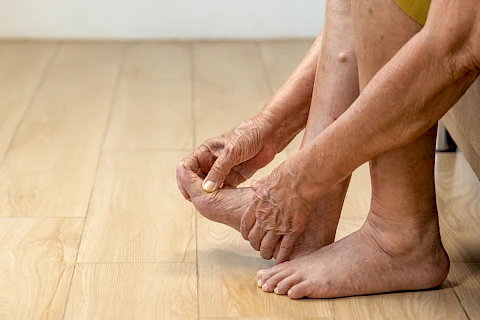
Diabetes can affect many parts of the body, but it often takes a significant toll on foot health. Seniors with diabetes need to pay special attention to their feet, as they are at a higher risk for complications. Proactive foot care is essential to avoid serious issues like infections or ulcers that can lead to more severe health problems. Seniors can take charge of their foot health by following the tips presented here.
Daily Foot Inspections
One of the most essential steps for seniors with diabetes is to inspect their feet daily. This simple personal care habit can prevent small problems from becoming major issues.
Start by setting aside a specific time each day for a foot check. Ensure you are in a well-lit area and seated comfortably. Use a mirror or ask for help if you can't see all parts of your feet clearly. Look for any cuts, blisters, redness, or swelling. If you notice anything unusual, contact your healthcare provider right away. Early detection prevents complications.
Proper Foot Hygiene
Good hygiene is another cornerstone of maintaining healthy feet. Keeping your feet clean and dry can help prevent infections. Wash your feet every day using warm water and mild soap. Rinse thoroughly and dry your feet well, especially between the toes, where moisture can cause fungal infections. Apply a moisturizer to keep your skin soft, but avoid the area between your toes. Also, keep your toenails trimmed. Cut them straight across to prevent ingrown nails, and if you find it difficult, seek help from a caregiver or a professional.
Choosing Supportive Footwear
Wearing the right shoes is vital for people with diabetic feet. Supportive footwear can help prevent injuries and provide comfort. Look for shoes that offer good support, sufficient room, and are made from breathable materials. When you try new shoes, do it in the afternoon when your feet are likely slightly swollen to ensure a good fit. Replace your shoes when they show signs of wear and tear to ensure constant support and protection. Wear socks with moisture-wicking properties to help keep feet dry.
Managing Blood Sugar Levels
Keeping blood sugar levels stable is essential for overall and foot health. High blood sugar can damage nerves and blood vessels, leading to foot problems. Monitor your blood sugar regularly and follow your doctor's guidance on maintaining target levels. A balanced diet rich in whole grains, vegetables, and proteins can help, along with regular exercise. Even short walks can improve circulation to your feet, adding another layer of protection.
Regular Check-Ups With a Podiatrist
Routine visits to a podiatrist are vital for preventing diabetic foot problems. A professional can spot issues that you might miss. Seniors should visit a podiatrist at least once a year or more frequently if recommended. During these visits, the podiatrist will check for any signs of complications and help with essential foot care, like trimming toenails and removing calluses. These professional assessments are critical to maintaining foot health.
Need Help With Foot Care? Count on Senior Helpers
With the right care and attention, diabetic foot problems can be prevented. By taking these steps, you can help protect your feet and overall health.
Do you need assistance with personal care, including foot hygiene? Senior Helpers is here for those with diabetes in Erie, Harborcreek, Bear Lake, Chandlers Valley, and Clarendon. Contact us today at Senior Helpers Warren. We're here to help you maintain a healthy, independent, and active lifestyle.